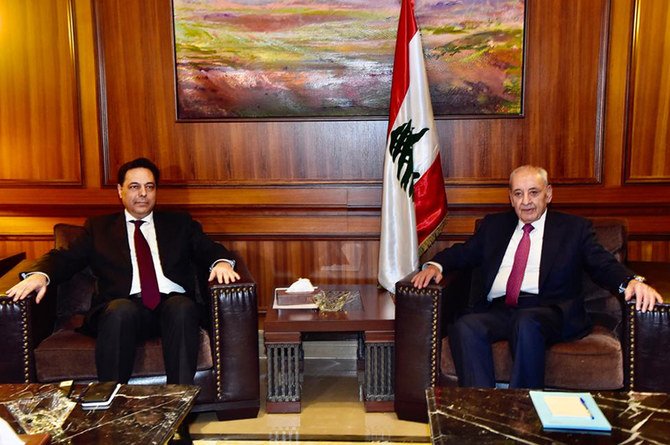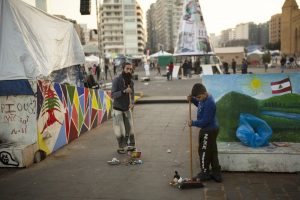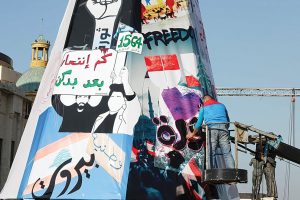
- ARAB NEWS
- 02 Jul 2025

Najia Houssari
BEIRUT: The challenges he must overcome became clear however from the onset of Saturday’s talks with various officials and lawmakers.
Parliament speaker Nabih Berri said he “insists on securing representation for all parliamentary groups,” in the next government — a position shared by his Shiite Amal party and Hezbollah.
Samir Al-Jisr, a deputy from Hariri’s Future Movement, urged Diab to form a government “of independent experts not affiliated with established political parties,” to rescue Lebanon from the brink of collapse.
“Considering that this government, just like Diab’s nomination, will be supported by only one political stripe, then its formation should take less than” a month or six weeks, he said after meeting the premier-designate.
[caption id="attachment_7288" align="alignnone" width="468"] Volunteers sweep trash in the central square where anti-government protesters have set up camp in downtown Beirut as Lebanon's newly designated prime minister began his consultations with parliamentary blocs to discuss the shape of the future government. (AP Photo/Maya Alleruzzo)[/caption]
Volunteers sweep trash in the central square where anti-government protesters have set up camp in downtown Beirut as Lebanon's newly designated prime minister began his consultations with parliamentary blocs to discuss the shape of the future government. (AP Photo/Maya Alleruzzo)[/caption]He was referring to allies Hezbollah, Amal and the Free Patriotic Movement founded by Christian President Michel Aoun who chose Diab to form a cabinet.
Such backing has sparked an uproar, with Sunni supporters of Hariri blocking roads and scuffling with security forces in Beirut and other cities for the past two consecutive nights to voice their opposition for Diab.
Some roads remained blocked on Saturday in Sunni-majority second city Tripoli and in the northern Akkar region.
Hezbollah sought to appease the anger of the protesters on Saturday, insisting that the next government will not be lopsided.
“No one should think the government will be one of confrontation or one endorsed by only one political stripe,” said Hezbollah MP Mohammad Raad after meeting Diab.
The new government, he said, will seek to “revitalize” the economy that has taken a beating since the unprecedented protests began on October 17.
Since then, tensions have been heightened by the looming bankruptcy of the debt-burdened Lebanese state.
[caption id="attachment_7287" align="alignnone" width="491"] Lebanese anti-government protesters erect a Christmas tree made of protest banners in Beirut’s Martyr Square on Saturday. (AFP)[/caption]
Lebanese anti-government protesters erect a Christmas tree made of protest banners in Beirut’s Martyr Square on Saturday. (AFP)[/caption]A dollar-liquidity crisis has pushed banks to impose informal capital controls on dollar deposits and the Lebanese pound, officially pegged to the US dollar, has lost around 30 percent of its value on the black market.
The faltering economy has pushed several companies to close, while surviving businesses try to stay open by paying half-salaries and laying off employees.
A recession of more than 0.2 percent is expected for this year, the World Bank says.
The international community, donors, and financial organizations have warned that debt-saddled Lebanon could ill afford any delay in getting a new government.
The United States, France and other allies of Lebanon have warned they would withhold financial support until a government that can demonstrate willingness to reform can be formed.
Multi-confessional Lebanon is ruled by a complex political system that seeks to maintain a fragile equilibrium between political parties representing the country’s major confessional sects.
It usually takes months to form a government as political groups haggle over the allocation of cabinet seats and the distribution of ministerial portfolios.